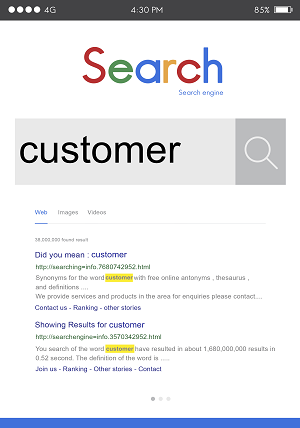
- The Importance Of Rank Tracking Local Keywords In 2018 - June 5, 2018
- How to Spot Opportunities from your Competitors’ Backlinks - July 19, 2017
- Why You Should Monitor Your Brand Daily - May 26, 2017
Even those who are new to optimizing their website for better customer click-through numbers have the opportunity to learn some simple tricks of the trade. It is, of course, something you can combine with the work of a good search engine marketing company for better real-world effect.
One way to optimize your site to make it more attractive to customers is by writing a good meta description. And just to put the questions to rest, yes, it still matters. It is as useful in optimizing for search engine rankings as it is in inviting people to click on your site when they find it on search.

What it is
It’s that short description that you see below a title and a website URL whenever you search for something. Without this description, you will probably see the next crawlable text on the website, and that’s bad news. That short description is your opportunity to market; it’s what customers will read to find out whether your site has what they need. If all they see there is “About Us” and other irrelevant text, their eyes are likely to wander to the next available option.
On keywords
The search engine is likely to highlight your meta keywords if they appear on the description. When writing your description, focus on what gets your audience’s attention. This doesn’t mean you shouldn’t add keywords; use keywords if you think the paragraph calls for it, but do not stuff them there. Your message should simply be clear and concise.
On length
As with your meta title, search engines like Google measure the length of your description by pixel, not by character. But meta description length is usually limited to 155 characters; this is intended to guide those who write descriptions. Anything too long will become truncated, which means the user cannot read the paragraph in its entirety when it appears on search. Use a meta description checker if you want to make doubly sure you’re within the limit.
Here’s a good meta description example:

On writing
Although the search engines do not use your descriptions to rank your website, these paragraphs still help your website gain some traction. How? When you write your description, you think only of one thing: getting that reader to click. Click-through rates do affect your ranking. So when you write that description, take it seriously.
Look at the example above. It has all the juice and none of the pulp; it’s the right length, too. It makes the user trust the website because the description says it all: here are experts who have tried the burger choices in which the user is interested. If you’re new in London, for example, and your budget and time are limited, wouldn’t you want to be sure you’re getting the best burger when you crave for one?
Here’s how to write a meta description:
- Learn to describe. Users are impatient. They want their search to give them immediately what they want. Your presence on a search engine results page (SERP) has a few seconds to convince users that your website is the one they need.
- Persuade people. No, you don’t need to be blatant about it. A call to action on the description is not needed. You should, however, write so that your 155-character-long paragraph convinces people. If it serves a good helping of curiosity, a user is more likely to click.
- Use the right words. Words that serve no purpose to the user and do not match their queries in any way are a waste of space. See this as an opportunity to market to your niche, to call out to them without being too obvious. Make sure the grammar and spelling are flawless. Review your description again and again. Use a meta description generator to check on the length and to see a real-world view of your description. One more tip: avoid using quotation marks.
When you really think about it, it is not difficult to come up with a killer description. As long as you know what your website is about, and know what audience you would like to target, you should be good. Work with your SEO or SEM provider, or at least ask some of your managers and project contributors what they think of your descriptions. Always remember that you’re writing this for people, not for algorithms.
Is your meta description optimized? Siteoscope will provide you the data for your website optimization efforts. Sign up today and get a free 30-day trial.




